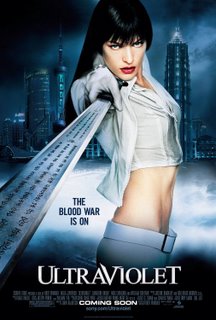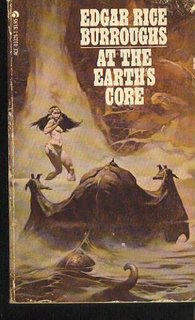Revisiting THE MONSTER MEN

I had a great time this past weekend rediscovering The Monster Men, Edgar Rice Burroughs' unique spin on Mary Shelley. I have a few things to say about it today at Rebels of Mars.
Unfinished essays and spontaneous eruptions on radical politics and popular culture


Here's the magnificent teaser poster for Spider-Man 3, which won't be hitting theaters for another 14 months.
Sony says that Spidey's costume is indeed black, not the traditional red and blue.
Alien symbiote?
Venom?
Can't wait.
[I know this post is confusing as hell for those of you unfamiliar with the comic book Spider-Man. But I promise...this poster and what it seems to imply is BIG news.]
Following my last post about Agorism.info, I’d be remiss if I didn’t draw attention once again to the extraordinary service B.K. Marcus provides with BlackCrayon.com. His site on “philosophical anarchism” is the first place you should look for information regarding anything anarchic, whether Left, Right, In-Between, or Without Hyphens. It’s chock full of essays, biographies, e-books, quotes, links, and an extremely helpful dictionary of anarcho-terms and labels. And what’s more, B.K. keeps the whole shebang updated with great regularity.
Take a look: BlackCrayon.com.

Fellow Left Libertarian conspirator Brad Spangler has launched a brand new site dedicated to spreading the philosophical, economic, and strategic ideas of the late Samuel Edward Konkin III (SEK3) — quite coincidentally marking the second anniversary of Sam’s death. Brad has stylishly crammed an awful lot into this site...and there’s plenty more to come. You’ll find a new PDF version of SEK3’s New Libertarian Manifesto, which is to This Movement of Ours what The Port Huron Statement was to SDS in the 1960s. You’ll find all the handy little PDF downloads of Sam’s Movement of the Libertarian Left (MLL) pamphlets, which I’ve been gradually reissuing since last fall. And best of all, you’ll find a never-before-available PDF e-booklet titled Agorist Class Theory, gathering together my distillation of Sam’s unfinished Agorism Contra Marxism and including a stirring foreword by Mr. Spangler himself. Oh, and there are a lot of nifty links included, too.
Check out Agorism.info, then bookmark it. Brad calls it a “one-stop shop for getting acquainted with Konkin’s agorism and getting new agorists up to speed.” It fills that purpose excellently.
-----
[Cross-posted at Rebels of Mars]
The nineteenth and last episode of Scott Sigler’s newest podcast novel, Ancestor, arrived sometime during my vacation, so I’ve been playing catch-up. Like EarthCore, its predecessor from last spring and summer, Ancestor is a compelling sci-fi thriller filled with, as Scott reminds us before each episode, “adult language, mature themes, and lots and lots of violence.” It’s kickass. Here’s Scott’s summary of the novel:

On a remote island in
A few of you are probably nodding and muttering, “
Scott reads/performs Ancestor himself, and he does a remarkable job. He’s learned a lot since EarthCore and seems to have put a greater effort into making each character’s “voice” unique. There isn’t a single slow moment.
You can download Scott’s entire performance of Ancestor, all 19 installments, for free. And look for EarthCore, if you haven’t already listened to it.
Added note: Scott has posted a comment indicating that Ancestor will only be available a short while longer for free; EarthCore is now available for a small fee at iTunes...and it's still a bargain.
 While most of Hollywood leans in a decidedly anti-war direction, it seems the neocons have managed to recruit some celebs for its war efforts. Case in point: Canadian model and actress Natasha Henstridge (Species, The Whole Nine Yards), who posed for this cheesecake shot now making a wide impact on the Internet.
While most of Hollywood leans in a decidedly anti-war direction, it seems the neocons have managed to recruit some celebs for its war efforts. Case in point: Canadian model and actress Natasha Henstridge (Species, The Whole Nine Yards), who posed for this cheesecake shot now making a wide impact on the Internet.
The Rothbard Caucus of the Libertarian Party, which I referred to in my last post, was launched in 2004 by LPer Scott Olmsted. Olmsted decided to revive the LP’s Radical Caucus, last active in 1984, as the Rothbard Caucus because he was dismayed that Murray Rothbard’s strategic insights had “disappeared down the [party’s] memory hole in less than two decades.” For one thing, Olmsted was disturbed that a prominent LP candidate for a federal office had recently proposed to tax legalized marijuana and even advocated tight government controls on marijuana’s distribution. Olmsted rightly saw these positions as steps backward.
While I do not support the Libertarian Party, or electoral politics generally, I do think the Rothbard Caucus serves a valuable function in refocusing movement attention on Rothbard’s strategic point of view:
I don’t believe any of these points are inconsistent with a non-political Left Libertarian action program.
-----

“Libertarians have given considerable thought to refining their basic principles and their vision of a libertarian society,” Murray Rothbard wrote. “But they have given virtually no thought to a vitally important question, that of strategy: Now that we know the nature of our social goal, how in the world do we get there?”
The one legendary piece of Rothbardiana that remains unpublished and out of reach for most of us is his April 1977 privately circulated Cato Institute memo Toward a Strategy for Libertarian Social Change. Justin Raimondo has called Murray’s 178-paged manuscript “a blockbuster” that “elaborated on a fully worked out strategic theory: The need for a movement, the concept of cadre, the necessity of calling for the abolition of state power as quickly as possible, the twin deviations of opportunism and sectarianism, the nature of ideological entrepreneurship, the question of leadership, the role of reason and emotion in building a movement, the error of the infallible party, and a historical analysis of the Old Right libertarian movement from the early fifties.” Toward a Strategy for Libertarian Social Change was, he added, “a masterful manifesto and political manual for activists, written from the perspective of a great libertarian theoretician who was also a hardboiled political realist, a manuscript that shows Rothbard, the philosophical man-of-action, at the top of his form.”
Unfortunately, the cover page of the manuscript, now almost three decades old, contained this note: “STRICTLY CONFIDENTIAL. Not to be quoted, discussed or circulated without the written or otherwise expressed permission of the author.” As Raimondo wrote in An Enemy of the State, his biography of Rothbard:
“Rothbard was not the author of this note, although at the time he allowed himself to be convinced that it was necessary. What was in one sense Rothbard’s most immediately useful book, Toward a Strategy for Libertarian Social Change was deemed too ‘hot’ for general circulation; even to Rothbard’s closest friends and collaborators, it seemed axiomatic that any book that quoted Lenin and objectively analyzed the strategic and organizational methods of both Marxism and right-wing authoritarians (as well as the American revolutionaries, classical liberals, and others) was bound to offend all the wrong people.
“It was only natural, given human nature and especially the nature of such a small and tightly knit movement, that such a pledge of confidentiality would arouse widespread notice, not only among libertarians, but among their declared enemies. Not long after it was written, the book’s existence was revealed in an article in National Review, which implied that Rothbard was an admirer of Lenin and that he was promulgating a conspiracy of anti-American revolutionaries who sought to subvert the very foundations of the Republic, if not Western civilization.”
I think that, 11 years after Murray’s death, it is appropriate and even crucial that Toward a Strategy for Libertarian Social Change be published and circulated — especially now, when warmongering neocons so thoroughly permeate Cato and the “official” libertarian movement, and when libertarians of both the left and paleo-right variety work so desperately to build a coalition movement.
To get a taste of
-----
Technorati Tags: New Libertarian, Movement of the Libertarian Left

Hell, I was born and raised and still live in
For the uninitiated (i.e., folks unfamiliar with fine Japanese films like Godzilla and Gamera), “daikaiju” is Japanese for “giant monster.” The Daikaiju band members — from
There isn’t a bad track on this entire album, and it races by at such a high velocity that I’ve been immediately clicking back to the opening track as soon as I hear the extraordinary last cut, “Farewell to Monster Island,” reach its end. I just can’t get enough of this stuff.
And I love the titles of these tunes: “Attack of the Crab Women," “Showdown in Shinjuku,” “The Daikaiju who Loved Me,” and my absolute favorite, “The Trouble with those Mothra Girls.”
I betcha thought surf music was dead. Nope.
 -----
-----
“Call me Ishmael.”
(Moby Dick by Herman Melville)
“It was a bright cold day in April and the clocks were striking thirteen.”
(1984 by George Orwell)
“You don’t know about me without you have read a book by the name of The Adventures of Tom Sawyer, but that ain’t no matter.”
(Adventures of Huckleberry Finn by Mark Twain)
“We were somewhere around
(Fear and Loathing in
I’ve got a new one to add:
“It all began, as usual, with the Greeks.”
(An Austrian Perspective on the History of Economic Thought by

I’m now offering — absolutely FREE and in time for distribution during the tax-preparation period — a fourth classic pamphlet by the late Samuel Edward Konkin III: Tax is Theft! It’s a handy PDF, which you can easily open with Adobe Reader. Print double-sided as many copies as you like, fold them into tri-fold brochures, and distribute them widely. This brochure is terrific for political outreach, especially to Libertarian Party types who need radicalizing or right-wing tax-evaders who need to know that a few of us lefties applaud their actions. The pamphlet is black and white to keep your printing and photocopying costs low, but it looks great when printed on a colored paper stock. On the back panel, there’s space for your rubberstamp or a sticky label so those interested in further info on the Movement of the Libertarian Left can find you.
Of course, still available are PDF files of the three prior pamphlets: War or Liberty: The Real Choice, Introducing the Movement of the Libertarian Left, and Counter-Economics.
You can get the PDF of Tax is Theft! (and the other three pamphlets) free by request by emailing me at antistate@gmail.com. By the way, once downloaded, feel free to pass these files on to others or make them available on your own website.
Agora! Anarchy! Action!
-----
Technorati Tags: New Libertarian, Movement of the Libertarian Left

Our local multiplex is now displaying this poster for a new film that normally wouldn’t particularly intrigue me. But here’s the deal:
First, it stars Milla Jovovich, one of my favorite pieces of eye-candy.
Second, Ultraviolet is written and directed by Kurt Wimmer. The last movie Wimmer both wrote and directed was Equilibrium, an underground libertarian classic and the best film nobody saw in 2002.
Set in the late 21st century, Ultraviolet is about a growing civil war between “normal” humans and genetically-modified humans. Jovovich plays the title character, who finds herself protecting a kid who’s been marked for death by the government.
My interest has been, er, aroused.

Speaking of The Batman (which I was just a few days ago), Warner has finally released on DVD the complete first season (13 episodes) of The Batman, the spiffy cartoon series now appearing weekly on Kids’ WB. This show has gotten a very bad rap from fans of the Bruce Timm animated series from the 1990s, and I think that’s undeserved. Here’s what I wrote about The Batman in September 2004, after seeing just two episodes:
“Friends, this half-hour show kicks serious butt, and it stands proudly alongside the Timm series. It’s as dark, if not darker, than Timm’s — which is a BIG plus when you’re still fighting the old Adam West image — and although it may be too early to judge, this show seems to me every bit as good. Jeff Matsuda produces the series and serves as its art director, so the animation is top-notch. Set just three years into The Batman’s career, the program depicts a younger Dark Knight than we’re used to. The new Batmobile rocks. Characters have been intriguingly redesigned. The most radical makeover so far is the Joker, with his shocking green dreadlocks, yellow-toothed smile, and a truly chilling, high-pitched cackle. I’m looking forward to seeing Matsuda’s takes on Penguin, Two-Face, Catwoman, and others. This Batman is a keeper.”
And it’s still a keeper. If you enjoy Batman and haven’t seen these cartoons yet, take a look.
 UPS deposited Murray Rothbard's two-volume, 1,084-paged Austrian Perspective on the History of Economic Thought at my front door this afternoon.
UPS deposited Murray Rothbard's two-volume, 1,084-paged Austrian Perspective on the History of Economic Thought at my front door this afternoon.I plan to begin reading it tonight.
I'll file a full report in about 16 months.
I’m still playing catch-up.
Roderick Long posted a terrific piece last Thursday about Ayn Rand's legacy for Left Libertarians. [Hey! You! Yeah, you in the back! No, not you with the beard...you, with the glasses and the “Leonard Peikoff Rocks!” tee-shirt. Yeah, you! Shut the hell up a minute till I share Rod’s remarks!]
Anyway, Roderick admits that Rand is “easily viewed as decidedly right-leaning”; note her support for American militarism, her defense of big business as a “persecuted minority,” her anti-feminism, and her favorite author being Mickey Spillane. (Gotta confess here — I’ve enjoyed Spillane, too.) Long attributes
Somewhere, is Howard Roark smiling?
-----
Technorati Tags: New Libertarian, Movement of the Libertarian Left

Just before I went on hiatus, I mentioned that I planned to re-read Edgar Rice Burroughs’ classic At the Earth’s Core for the first time since high school. Well, I did, while curled up in a wicker chair on the lanai of our rented house in Kaua’i, and I had one hell of a great time. After more than 30 years, I’d forgotten most of the story. But what I did remember was Dian the Beautiful, Pellucidar’s more primitive, but nonetheless gorgeous, version of Barsoom’s Dejah Thoris. Dian, in addition to Burroughs’ mastery of world-creation, made the utter nonsense of a hollow earth irrelevant. What a terrific story. I’m sure I’ll be re-reading ERB’s sequel, Pellucidar, in the next few weeks.
Anyway, upon my return last Sunday night, I found two wonderful speculations on hollow-earth theory from Roderick Long attached to my farewell-for-now post. Take a look.
Fellow traveler B.W. Richardson remarks that “things have seemed a little wintry on the freedom blogs lately — much bleak news, many of the regulars I frequent seeming tired.”
I’m noticing the same thing. But then, I’m also just back from two weeks of sun and snorkeling, so everything seems wintry to me right now. And fact is, the news is almost always bleak for freedom-lovers. That’s why we have to struggle so goddamn hard to keep our spirits up.I talked about this a few years ago in a piece titled “Hey, Libertarians — Cheer Up!”

My favorite interpretation of Batman has long been that of Frank Miller, creator of the graphic novels The Dark Knight Returns (1986), Batman: Year One (1987), and The Dark Knight Strikes Again (2001-2002). In the groundbreaking Returns, Batman came to realize that the world’s real criminals lie far beyond the Joker and Two-Face; what tears apart the fabric of society is the corruption of our so-called leaders. And in Strikes Again, Batman actually launched a revolution against a Power Elite led by (who else?) Lex Luthor and Brainiac.
 Now it seems that writer-artist Paul Pope is offering a similar spin on the Caped Crusader. February 15, DC Comics will release the first installment of Pope’s four-issue graphic novel Batman: Year 100. The 200-page miniseries moves Batman ahead 33 years into, according to Wired magazine, “a high-anxiety future, where totalitarianism has nearly snuffed out the remnants of humanity.
Now it seems that writer-artist Paul Pope is offering a similar spin on the Caped Crusader. February 15, DC Comics will release the first installment of Pope’s four-issue graphic novel Batman: Year 100. The 200-page miniseries moves Batman ahead 33 years into, according to Wired magazine, “a high-anxiety future, where totalitarianism has nearly snuffed out the remnants of humanity.
Libertarian Batmaniacs should check with their comics dealers in two weeks. We might have another freedom classic on our hands.
 In my catch-up this afternoon after two weeks away, I came across a new and delightful online audio lecture by Ralph Raico from last year's Mises University. Ralph talks about the 1950s and early 1960s, his friendship with Murray Rothbard and other members of the Mises and Bastiat Circles, his respect for Ayn Rand (with serious reservations about her "secondhanders," like the Brandens and Leonard Peikoff), the Taft campaign of 1952, etc. Wonderful stuff and well worth hearing. You'll find it right here.
In my catch-up this afternoon after two weeks away, I came across a new and delightful online audio lecture by Ralph Raico from last year's Mises University. Ralph talks about the 1950s and early 1960s, his friendship with Murray Rothbard and other members of the Mises and Bastiat Circles, his respect for Ayn Rand (with serious reservations about her "secondhanders," like the Brandens and Leonard Peikoff), the Taft campaign of 1952, etc. Wonderful stuff and well worth hearing. You'll find it right here.
Yes, after more than two weeks in Hawaii on vacation, I've returned. But I'm just not quite in the mood for fullblown blogging yet. Probably tomorrow. I'm still shaking geckos offa my sandals.
In the meantime, I thought I'd share a few photos of the house we rented in Kaua'i, called the Kaua'i Waterfall Home. It blew me away.
The final photo is of the backyard. Sheesh.



